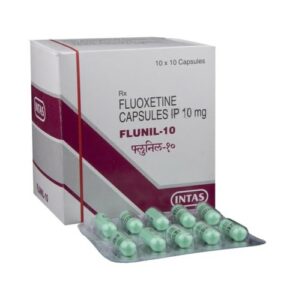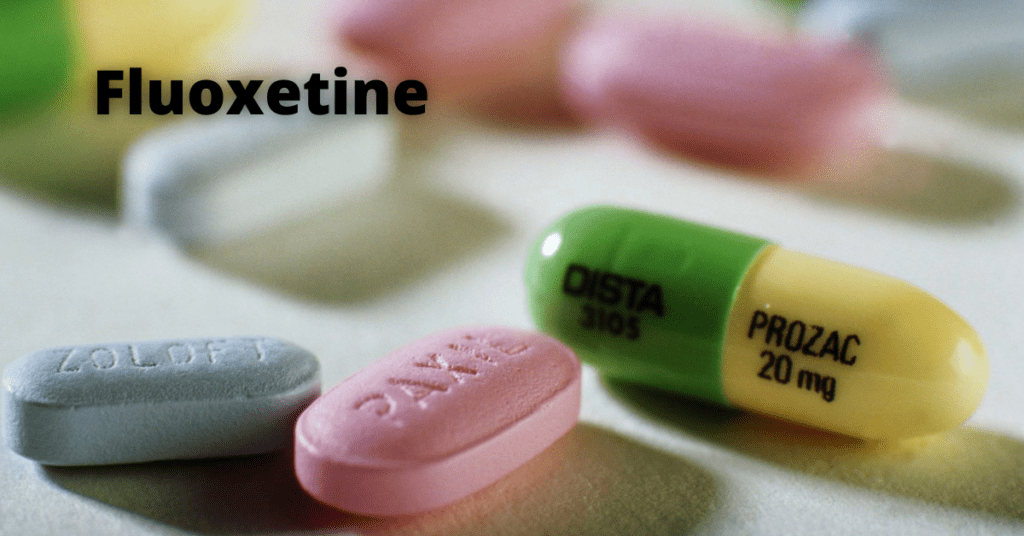Fluoxetine is a selective serotonin reuptake inhibitor (SSRI) antidepressant. Millions of people use this drug around the world. In this blog post, we’ll discuss alternative treatment options for depression and why it may be time to consider an alternative treatment option if you or your loved one has been taking Fluoxetine for more than six months.
Contents
What Is Fluoxetine?

Fluoxetine is an antidepressant that was initially for the treatment of depression, obsessive-compulsive disorder (OCD), bulimia nervosa, and panic disorder. Fluoxetine belongs to a class of drugs. These are selective serotonin reuptake inhibitors (SSRIs). Other SSRIs include fluvoxamine (Luvox), paroxetine (Paxil, Pexeva), sertraline (Zoloft), and citalopram (Celexa). Fluoxetine was approved by the FDA in 1987 for the treatment of depression under the brand name Prozac.
What Does Fluoxetine Treat?
Fluoxetine can help to treat these disorders:
Fluoxetine can help to treat major depressive disorder. This is a mood disorder that has persistent feelings of sadness and loss of interest. This medicine is thought to work by increasing the activity of serotonin, a neurotransmitter that helps regulate mood and behavior.
Obsessive-Compulsive Disorder (OCD)
Fluoxetine is used in combination with psychotherapy for the treatment of OCD. There are two types of this disorder: one characterized by unwanted thoughts, such as fear about germs or concern over losing things; and another type where people perform repeated actions such as handwashing or checking locks repeatedly until it feels “just right”. Fluoxetine works on both types but is only indicated for symptom relief and is not approved to treat these disorders directly.
Bulimia Nervosa
This disease involves frequent episodes of binge eating followed by behaviors intended to avoid weight gains, such as self-induced vomiting or excessive exercise. Fluoxetine may help reduce the number of binge eating episodes. Furthermore, it may promote weight loss in people with bulimia nervosa.
Panic Disorder
This is a disorder that means repeated panic attacks, which are sudden feelings of terror. These may include chest pain, shortness of breath, dizziness, or nausea. Fluoxetine can help reduce the number of panic attacks. Furthermore, it can improve the quality of life in people with this condition.
How Does Fluoxetine Work?
Fluoxetine belongs to a class of drugs called selective serotonin reuptake inhibitors (SSRIs). SSRIs are the most common antidepressants. These work by blocking the reabsorption (reuptake) of serotonin in the brain. This increases the level of serotonin available in the brain. This as a result helps to improve mood or regulate behavior.
However, this medication should not be stopped abruptly. This can cause withdrawal symptoms. Talk to your doctor about how to safely stop taking fluoxetine.
Considerations When Taking Fluoxetine
- Fluoxetine is usually taken once a day, in the morning or evening. The dose you take will depend on the disorder of the patient. It is important to take fluoxetine exactly as prescribed by your doctor and not to change the dose without talking to your healthcare provider first.
- It may take several weeks for this medication to start working. You should continue taking it even if you feel better after a few days. If you experience any side effects, talk to your doctor about the treatment.
- This medicine should not be taken with MAO inhibitors, such as isocarboxazid (Marplan), phenelzine (Nardil), or tranylcypromine (Parnate). These medications can cause serious side effects when taken together.
- Fluoxetine should also not be taken during pregnancy unless it is prescribed by your doctor. This medication can increase the risk of birth defects. It is important to talk to your healthcare provider about the risks and benefits of taking fluoxetine if you are pregnant or breastfeeding.
Dosage of Fluoxetine
The dosage of fluoxetine will vary depending on the condition of the consumer. Your doctor may prescribe a different dose than those listed here.
You can take this medication orally once daily with or without food and water, usually in the morning or evening. Swallow this medication whole; do not split, chew, crush, dissolve, snort/inhale (sniff) it because doing so can cause serious side effects such as high blood pressure and irregular heart rhythm that could result in death.
Furthermore, it is important to take this medication exactly as prescribed by your healthcare provider and continue taking it even if you feel better after a few days of treatment. If you stop taking fluoxetine suddenly or miss doses, talk to your healthcare provider about how to safely restart treatment.
Possible Side Effects of Fluoxetine
Patients can generally tolerate fluoxetine. However, some people experience side effects when taking it. The most common side effects are:
Nausea
This medicine may cause nausea. You can treat this with anti-nausea medications.
Diarrhea
This medicine may cause diarrhea. You can treat these further by taking other medications or adjusting the dose of fluoxetine.
Fluoxetine may cause some people to gain weight. Weight loss is also a possible side effect of this medication.
Sexual Dysfunction
This medicine may cause problems with sexual function such as difficulty achieving an erection or ejaculating. However, this problem usually goes away after you discontinue the intake of the medication.
Loss of Appetite
Fluoxetine may cause some people to lose their appetite. If you experience this symptom, it is important to eat regular meals and snacks to help avoid weight loss.
Drowsiness
This medicine may cause drowsiness, especially when taken with other medications that can also cause drowsiness, such as antihistamines, pain relievers, and tranquilizers.
Alternatives to Fluoxetine
Many people take Fluoxetine for a number of reasons. Some are prescribed the medication by their doctor, while others buy it from an online pharmacy with a prescription. However, many people do not want to rely on this drug and its significant side effects any longer. In this post, we will discuss some alternatives that may be more suitable for you or your loved one who is suffering from depression and anxiety.
St. John’s Wort: This is a natural herb that has been shown to be effective in treating mild to moderate cases of depression. You can find it at most health food stores and comes in tablet or capsule form.
Tryptophan Supplementation: Tryptophan is an amino acid that is used by the body to make serotonin, one of the mood-regulating neurotransmitters. Low levels of serotonin are often associated with depression and anxiety. Furthermore, you can find tryptophan supplements at most pharmacies or online retailers.
Valerian Root: This is a plant that has been used for centuries to treat a variety of issues, including anxiety and insomnia. It can be found at most health food stores in capsule or tincture form.
SAMe (S-Adenosylmethionine): SAMe is a natural compound that is produced by the body. It has been shown to be effective in treating depression, anxiety, and osteoarthritis. It can be purchased online or at some health food stores.
Vitamin B12 Shots: Vitamin B12 is an important vitamin for mood regulation. Deficiencies in this vitamin have been linked with depression and anxiety. You can find B12 shots at most pharmacies or online retailers.
Exercise & Diet Changes: Exercise and eating a healthy diet can have positive effects on mood. However, these are lifestyle changes that can be difficult to maintain, but may be worth it in the long run!
Conclusion
Fluoxetine is a drug that was introduced in the early 1980s. This helps to treat depression, obsessive-compulsive disorder (OCD), bulimia nervosa, panic attacks, premenstrual dysphoric disorder (PMDD), and social anxiety. It belongs to a class of drugs called serotonin reuptake inhibitors or SSRIs for short. There are many possible side effects of this medication such as nausea, vomiting, headaches, insomnia or trouble sleeping at night; dry mouth; changes in appetite; feeling jittery all the time; sweating more than usual; tremors or shaking hands. These all can become worse by drinking alcohol while taking fluoxetine. If you experience any of these visits a doctor as early as possible.
If you are looking for affordable Online Counseling MantraCare can help: Book a trial therapy session


